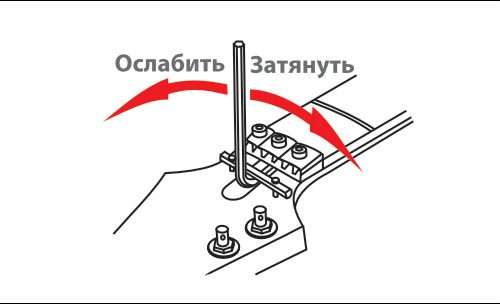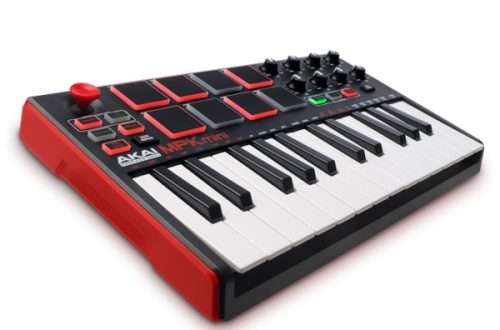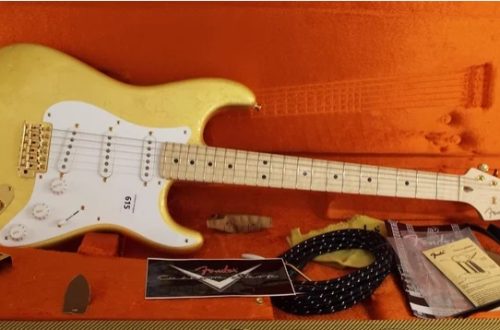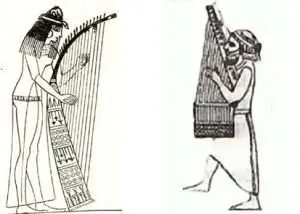
Acoustic or digital piano for learning: what to choose?
Digital or Acoustic Piano: Which is Better?
My name is Tim Praskins and I am a renowned US music teacher, composer, arranger and pianist. In my 35 years of musical practice, I have been able to try out acoustic and digital pianos from almost all brands. People from all over the world ask me for advice on piano playing and inevitably want to know the answer to the question: “Can a digital piano replace an acoustic one?”. The simple answer is yes!
Some pianists and piano teachers may argue that a digital piano will never replace a real acoustic instrument. However, these people do not take into account one important question: “What is the purpose of owning a piano for an aspiring musician or pianist?” If the goal is to “make music” and enjoy the process of making it, then a good digital piano is the best fit for the job. It enables anyone to learn how to play the keyboard, make music and enjoy their hard work.
If that’s what you’re looking for, then a high quality digital piano (also known as an electric piano) is a great option. The price of such an instrument varies from about 35,000 rubles to 400,000 rubles. However, if your musical goal is to become a concert performer and/or the best musician in the field, if you strive to do everything to conquer the musical pinnacle, I would say that in the end you will need a real top quality acoustic piano. At the same time, as far as I know, a good digital piano will last for several years, depending on the quality of the instrument itself.
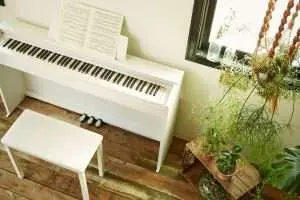
When it comes to my personal piano experience, I use digital instruments more often in my music studio for several reasons. First, the built-in headphone jacks allow me to plug in stereo headphones for practice so I don’t disturb others. Tue _Others, digital pianos allow me to use technologies that acoustic instruments can’t, such as connecting to an iPad for interactive music lessons. Finally, what I like about digital pianos is that they don’t break down like my acoustic instruments do. Of course, I don’t enjoy playing an out of tune piano, and acoustic pianos (regardless of brand, model, or size) break down quite often due to large fluctuations in weather and humidity levels, or perhaps I play an acoustic piano that just has a hard time supports customization. Good digital pianos are not affected in this way, they remain in a constant state, as they were tuned.
Of course, I can always call in a professional to set up an acoustic piano, and I do this often. But the cost of a piano tuning service (with a really knowledgeable person) is at least 5,000 rubles or at each tuning, depending on the area in which you live and the technique you choose. A good acoustic piano really needs to be tuned at least once or twice a year to be sure you can play it. Especially if you can’t tell the difference in sound because your ear is not yet developed to hear when the piano breaks down (which happens to many people). You can, of course, tune an acoustic piano whenever you want, and even wait many years before doing so. But if suddenly you teach someone to play the keyboard, do not forget
An out of tune piano leads to poor musical ear habits, hinders the development of fine ears… Do you really want this to happen? I know people who probably tune their acoustic pianos every 5-10 years because they just don’t care if they don’t sound good, because they don’t play at all, don’t play well or have a bear in their ear! Also, if you don’t have an acoustic setup for a long time, then it will be harder for the tuner to get the job done. So in the long run, delaying tuning harms not only the music you play, but the instrument itself.
Undoubtedly, I love playing great, harmonious acoustic grand pianos such as Steinway, Bosendorfer, Kawai, Yamaha and others because they provide a pure playing experience. This experience has yet to be achieved with any digital piano I have played. But you should already have enough skill and experience to understand the subtle musical difference, and if so, then you have good reason to enjoy playing and owning great acoustic pianos. However, these reasons are starting to fade quickly for the younger generation because many young musicians just want to play and not become professional pianists. They are surrounded by music technology and don’t put off playing a good digital piano because it gives them musical enjoyment, and that’s the purpose of enjoying playing a digital piano!
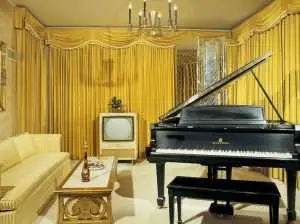
Digital pianos fill this need with an interactive USB/MIDI connection to external devices. Also, as I mentioned earlier, in days gone by, I was limited by the amount of time I could spend with an acoustic instrument. In youth, and even now, the volume of an acoustic piano can disturb family members or even other musicians if it is a studio. Playing an acoustic piano in a typical living room, family room, or bedroom is a really loud activity, and always has been. It’s okay if no one is home, you live alone, if no one is watching TV nearby, sleeping, talking on the phone, or just in need of silence, etc. But for all practical purposes and for most families, good digital pianos offer so much more. in terms of flexibility along with sound quality.
When comparing piano sound reproduction and key feel between a new digital piano and a used acoustic piano, it really is a matter of personal preference and price range.a. If you can afford to pay around £35,000, or £70,000 like most buyers, then a new digital portable (with stand, pedals, and bench) or full body grand piano from Yamaha, Casio, Kawai, or Roland would typically be much a better option than an old used acoustic piano. You can’t buy a new acoustic piano for that kind of money. For most people who have never played an acoustic piano, if at all, it is very difficult to tell the difference between digital and acoustic in terms of the sound of the piano, the action of the piano keys and pedals.
In fact, I have had many sophisticated musicians, concert performers, opera singers, music teachers, and audience members tell me that they were extremely impressed with playing and/or listening when they heard or played a good digital piano at a slightly higher price. range e (from 150,000 rubles and above). It is important to note that acoustic pianos are not all the same in tone, touch, and pedaling, and can differ from one another in many ways. This is also true for digital instruments – not all of them play the same way. Some have heavier key movement, some are lighter, some are brighter, others are softer, and so on. So in the end it comes down to personal taste in music ,what your fingers and ears like, to what makes you musically happy and satisfied.
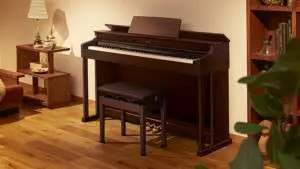
I love piano teachers and my two daughters are piano teachers. I have been a successful piano, organ, guitar and keyboard teacher for over 40 years. Since I was a teenager, I have owned many good acoustic and digital pianos. During this time, I have found one thing for sure: if a piano student does not enjoy learning and playing the piano, then it does not matter what type of piano (digital or acoustic) he plays at home! Music is food for the soul, it gives happiness. If at some point this does not happen to a piano student, then you are wasting your time. In fact, I have another daughter who was in this position when she took piano lessons as a teenager and tried to enjoy it… All this just didn’t work for her, it was noticeable despite the fact that she had a good teacher. We stopped piano lessons and immersed her in the flute she was always asking about. A few years later, she became very proficient with the flute and eventually achieved such mastery and loved it so much that she became a flute teacher :). She became interested in music and excelled inthat gave her personal musical joy. Here’s the thing… not digital or acoustic, but JOY in playing music and in my case, that’s what a piano is for.
Digital electric piano.
It is true that a digital electric piano must be plugged into an electrical outlet, but an acoustic piano does not. I’ve heard the argument that a digital piano won’t work if the power goes out, but an acoustic piano will, and so it’s better. While this is a true statement, how often does this happen? Not often, unless there is a big storm that cuts off the power or destroys your home. But then you will find yourself in the dark and see nothing, and will probably be busy putting things in order in a critical natural situation! In fact, every once in a while the power goes out here in Phoenix, Arizona in the middle of summer when everyone turns on their air conditioners in the 46-degree heat! When this happens, you won’t be able to stay at home for long, because without air conditioning you start to heat up pretty quickly 🙂 So playing the piano at this moment is not the first thing you think about :). But it is important to know if you do not have electricity inwhere you live, or the electricity you use is not reliable, then DO NOT buy a digital piano, but get an acoustic instrument instead. It’s definitely a logical choice. However, when an acoustic piano is constantly subjected to major changes in temperature and/or humidity, its condition and sound can be adversely affected.
Many digital pianos have a USB storage option for storing music recordings and/or playing music so you can listen to and evaluate your performance, or play along with other people’s recordings to study music more accurately. You can also connect to a computer or iPad using inexpensive music software or the apps I use. With computer music software, you can play music on the piano and then view it as sheet music on your computer. You can take these sheet music from your computer and edit it in a number of useful ways, print it out in full sheet music format, or even play it automatically to listen to your performance.
Music education and interactive software for digital pianos are incredibly advanced these days and can help speed up the learning process by not only making piano playing much more fun, but also more intuitive. This interactive technique for improving piano practice really appeals to both young students and most adults who have tried it, and is a great practice tool to motivate students to get results. I’ve been teaching piano for many years now, and instead of being a little wary of this technology, I’ve been using educational technology for decades and I realize that a lot of it really does help keep students and musicians musically engaged with the goal of becoming an even better pianist.
One of the most popular iPad apps for learning to play piano is Piano Maestro .. This app offers what I believe to be a comprehensive piano learning program for the beginning student. Piano Maestro is a very entertaining app that is fun but at the same time teaches you many musical concepts and fundamentals and allows you to constantly develop and improve. This app features Alfred’s popular piano course, which teachers around the world use in their classrooms. The interactive nature of the Piano Maestro, combined with a direct response to your playing, allows you to learn in a clearer way that conventional acoustic pianos simply can’t do. I would recommend that you take a look at Piano Maestro for iOS devices to see what I’m talking about, as well as other useful learning apps that help a lot.
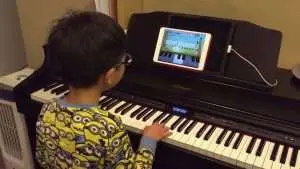
Digital pianos are becoming more sophisticated in their overall design and have more attractive cabinets. In other words, they look great. Acoustic pianos have generally always looked good in their traditional form, so they haven’t changed much. So why would anyone want an acoustic piano over a digital one? The point is that a good acoustic piano is still superior in sound, touch, and pedaling compared to many digital pianos, so I won’t pretend that digital pianos are “better” in that sense. BUT… who defines “better?”.
Can you tell if an acoustic piano is better than a good digital piano if they were side by side? In a blind test of playing with good digital and acoustic pianos placed side by side behind a curtain, I asked people who play and don’t play piano to tell me if they prefer the sound of one piano over the other, and can they identify a digital or acoustic piano? The results were interesting but not surprising to me. In most cases, listeners could not tell the difference between a digital piano and an acoustic piano, and in many cases they liked the sound of a digital piano more than an acoustic one. Then we called two groups – beginners and advanced pianists – and blindfolded them. We asked them to play the piano and identify what type of piano it was. Yet again,
Some of the acoustic pianos may change over time and gradually degrade depending on the outside weather conditions as well as how they are handled. A good modern digital piano does not usually change over the years in the same way that an acoustic piano does. However, certain models may be an exception as they have moving parts and may need adjustment, key replacement or other assistance during their lifetime depending on the situation. Speaking of durability, a good digital piano can last 20-30 years or more, depending on the brand and model, and I personally have digital electric pianos of this age in my studio. They still work fine. However, there are many worn or misused acoustic pianos that are not in good condition. sound bad and play wrong, do not stay in harmony; These pianos cost more to repair than the pianos themselves. In addition, almost all acoustic pianos depreciate over the years, regardless of condition, and some more so than others.
Typically an acoustic piano (regular or grand piano) is worth less than 50% – 80% of its original value a few years later. The cushioning on a digital piano is also guaranteed to be great over the years. Therefore, I suggest that you buy a piano with a focus on how it should perform well and evoke feelings and emotions in you when you play it, rather than thinking about investment and resale value. Perhaps some expensive and highly sought-after grand pianos may be the exception to this rule, but the average family probably won’t face this situation anytime soon! In general, if you are learning to play the piano, you want music to bring you fun, enjoyment, you are interested in playing it.
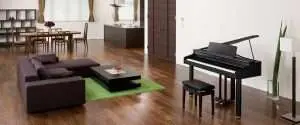
Playing music can certainly be serious business, but it also has to be enjoyable and fun. Whether students like it or not, it is necessary to take lessons and learn how to play the piano, accepting its boring, stressful and painful moments, such as maybe a teacher with whom he did not find contact, or do not like a particular lesson or do not like the music from the textbook, or not wanting to practice at certain times, etc. But nothing is perfect and it’s just part of the process…but if you love music then you will succeed. Students and even advanced musicians may need digital piano headphones to play in privacy. As I mentioned earlier, paying hundreds or thousands of dollars to tune a piano isn’t fun either. Maybe,
There are many reasons to buy a good digital piano, but most of all, many of them really deliver a very enjoyable playing experience that will give you the feeling of playing a real, high-quality acoustic piano. Most people feel like they’re playing a good piano with a well-weighted and balanced keyboard that promotes great playing, great dynamics and expression. Many of these digital pianos also impress with full treble pedals, just like good acoustic pianos do.
Many of the newer and better digital pianos also feature the realistic sound of real acoustic pianos, such as string resonance , sympathetic vibrations, pedal resonance , touch controls, damper settings, and piano sound voice control. Some examples of quality digital pianos in the higher price range (over $150,000): Roland LX17, Roland LX7, Kawai CA98, Kawai CS8, Kawai ES8, Yamaha CLP635, Yamaha NU1X, Yamaha AvantGrand N-series, Casio AP700, Casio- Bechstein GP500, Samick SG500 Digital Mini Grand and many other digital pianos. In the lower price rangee (up to 150,000 rubles): Yamaha CLP625, Yamaha Arius YDP163, Kawai CN27, Kawai CE220, Kawai ES110, Roland DP603, Roland RP501R, Casio AP470, Casio PX870 and others. The digital pianos I have listed are impressive in their performance and range of instruments, relative to their price range . Depending on your budget, a good digital electric piano can be a great choice for your musical needs.
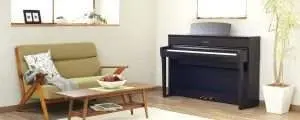
Good new acoustic pianos start at around $250,000 and sometimes go over $800,000, and they require more maintenance, as I mentioned earlier. Many of my piano teacher friends (who are great pianists) have digital pianos as well as acoustic pianos and love them equally and use both. A piano teacher who has both an acoustic and a digital piano can adjust to the different needs of the students. In terms of mechanical and electronic reliability , my experience has been very good with both acoustic and digital pianos, as they are higher quality brands. You just have to take care of your piano. Based on my experience, a piano not from a brand line can sometimes be
expensive and unreliable, so be careful and stay away from brands such as Williams, Suzuki, Adagio and some others designed in China.
My four favorite inexpensive digital cabinet pianos for $60,000-$150,000 are the Casio Celviano AP470, Korg G1 Air, Yamaha CLP625, and Kawai CE220 digital pianos (pictured). All four brands have a very good price range ratioand quality, all models sound great and have many interesting features. I have written reviews of these tools and many other brands and models on my blog, so check them out when you have time and look for my other reviews and news using the search button at the top. No matter what type and model of piano you buy, this is a wonderful piece that will make you enjoy your music to the fullest. There is nothing better than playing music to fill the house with a beautiful melody, wonderful memories and a gift that will delight you all the time. … so don’t miss this opportunity no matter what age you are… from 3 to 93 and older.
Learn to play the piano, play great MUSIC!



